外研版英语八年级上册 Module 10 Unit 3 Language in use 课件 (共28张PPT)
文档属性
| 名称 | 外研版英语八年级上册 Module 10 Unit 3 Language in use 课件 (共28张PPT) |
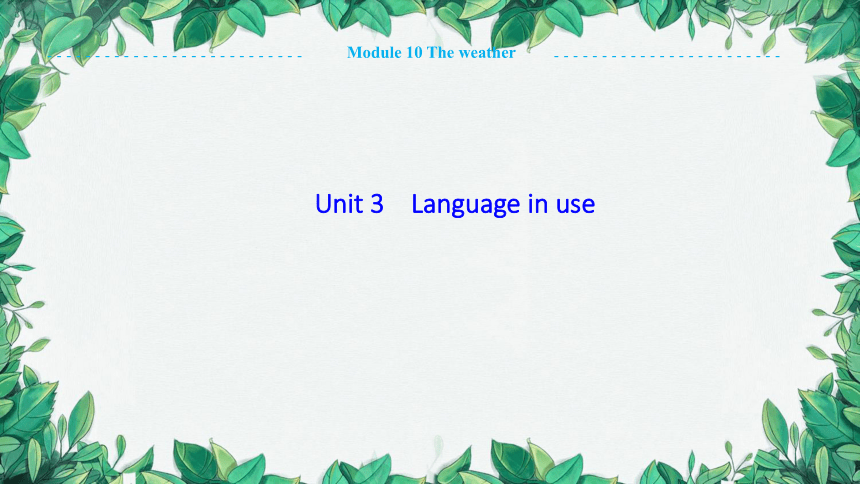
|
|
| 格式 | pptx | ||
| 文件大小 | 4.3MB | ||
| 资源类型 | 教案 | ||
| 版本资源 | 外研版 | ||
| 科目 | 英语 | ||
| 更新时间 | 2023-07-01 22:57:38 | ||
图片预览

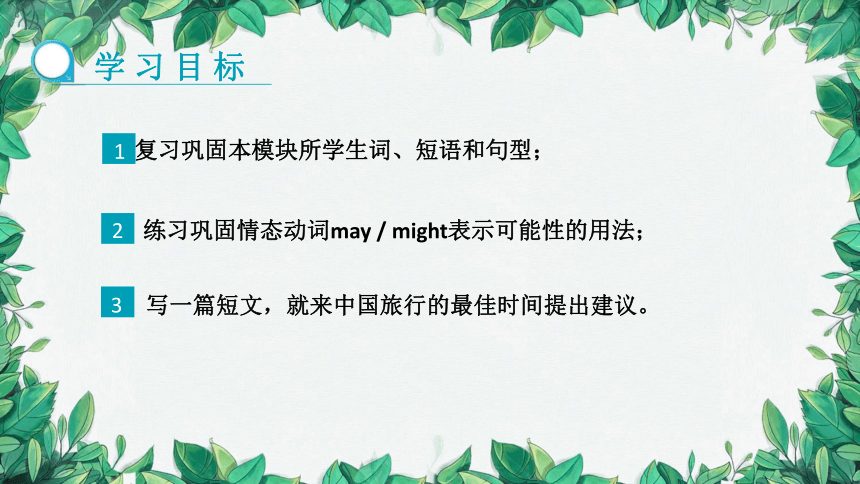
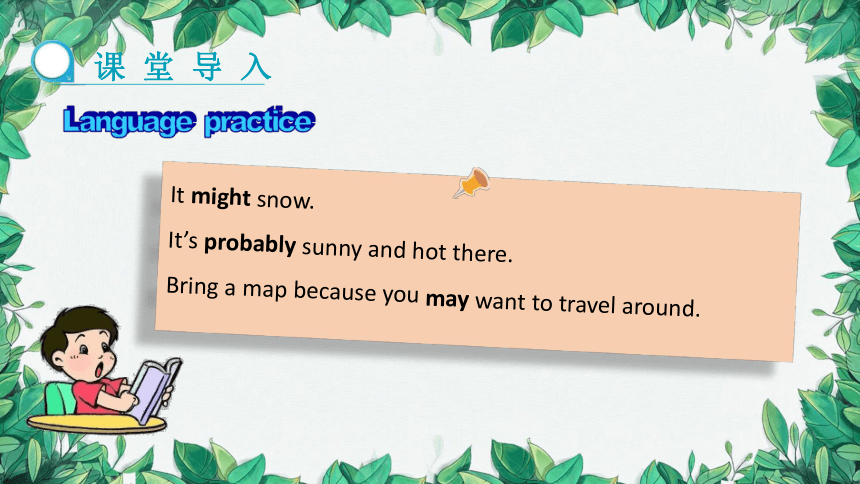
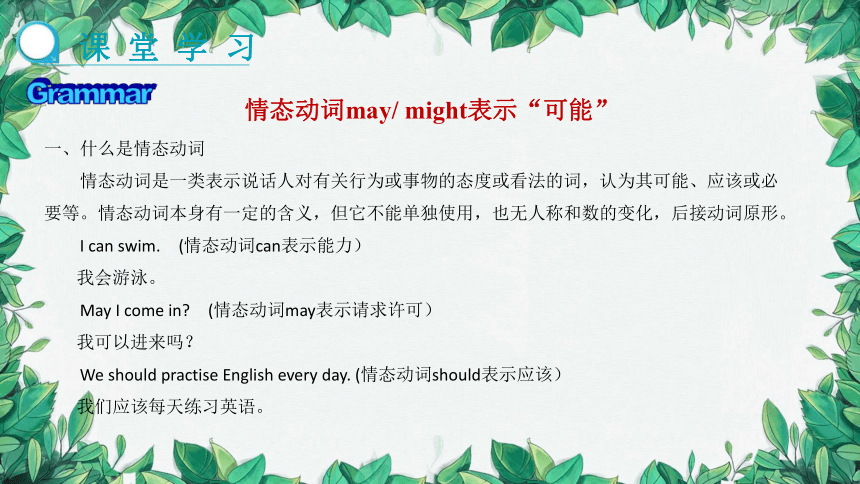
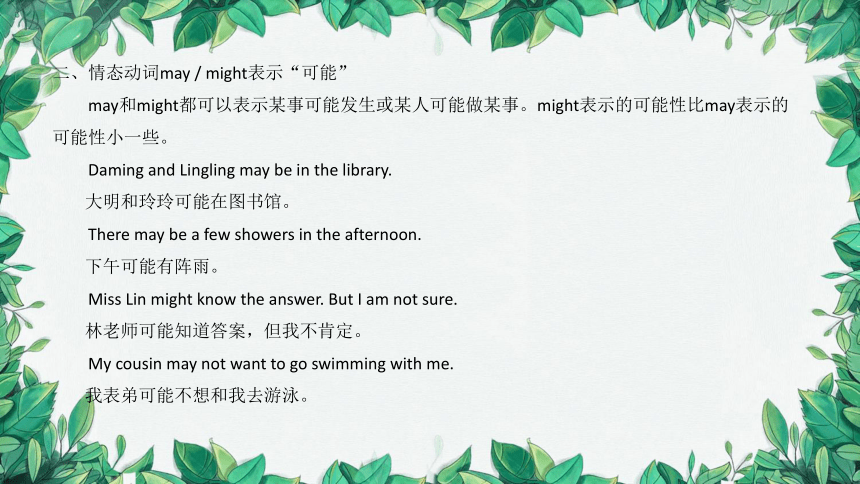
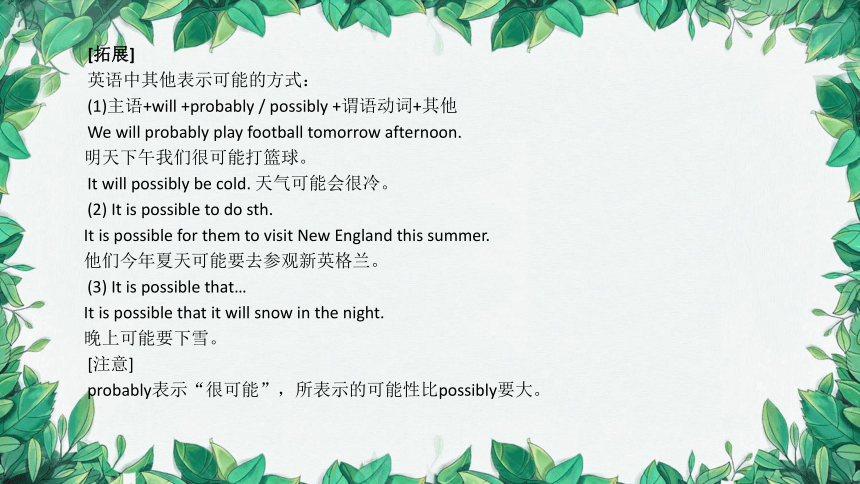
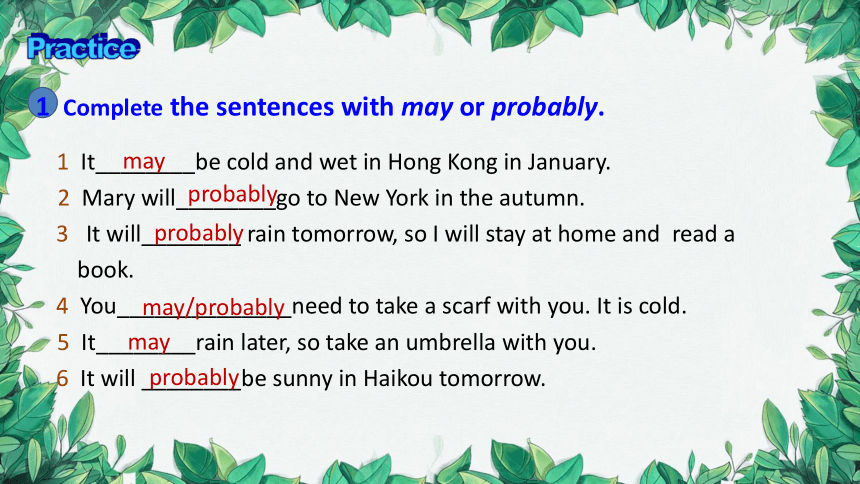
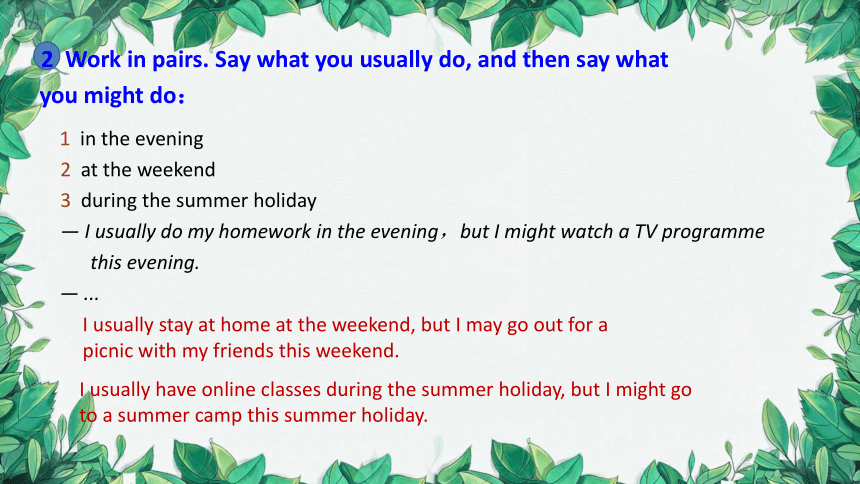
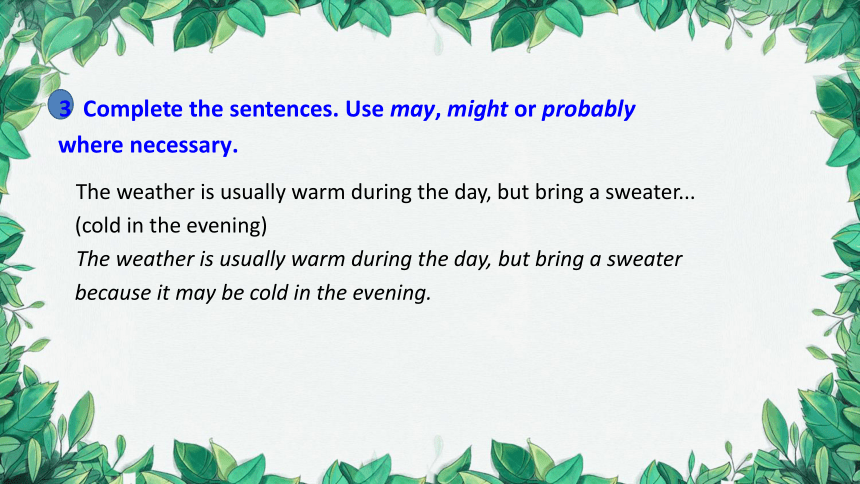
文档简介
(共28张PPT)
Unit 3 Language in use
Module 10 The weather
--------------------------- ------------------------
学 习 目 标
复习巩固本模块所学生词、短语和句型;
1
3
写一篇短文,就来中国旅行的最佳时间提出建议。
练习巩固情态动词may / might表示可能性的用法;
2
It might snow.
It’s probably sunny and hot there.
Bring a map because you may want to travel around.
课 堂 导 入
Language practice
情态动词may/ might表示“可能”
一、什么是情态动词
情态动词是一类表示说话人对有关行为或事物的态度或看法的词,认为其可能、应该或必要等。情态动词本身有一定的含义,但它不能单独使用,也无人称和数的变化,后接动词原形。
I can swim. (情态动词can表示能力)
我会游泳。
May I come in (情态动词may表示请求许可)
我可以进来吗?
We should practise English every day. (情态动词should表示应该)
我们应该每天练习英语。
课 堂 学 习
Grammar
二、情态动词may / might表示“可能”
may和might都可以表示某事可能发生或某人可能做某事。might表示的可能性比may表示的可能性小一些。
Daming and Lingling may be in the library.
大明和玲玲可能在图书馆。
There may be a few showers in the afternoon.
下午可能有阵雨。
Miss Lin might know the answer. But I am not sure.
林老师可能知道答案,但我不肯定。
My cousin may not want to go swimming with me.
我表弟可能不想和我去游泳。
[拓展]
英语中其他表示可能的方式:
(1)主语+will +probably / possibly +谓语动词+其他
We will probably play football tomorrow afternoon.
明天下午我们很可能打篮球。
It will possibly be cold. 天气可能会很冷。
(2) It is possible to do sth.
It is possible for them to visit New England this summer.
他们今年夏天可能要去参观新英格兰。
(3) It is possible that…
It is possible that it will snow in the night.
晚上可能要下雪。
[注意]
probably表示“很可能”,所表示的可能性比possibly要大。
1 It________be cold and wet in Hong Kong in January.
2 Mary will________go to New York in the autumn.
3 It will________ rain tomorrow, so I will stay at home and read a book.
4 You______________need to take a scarf with you. It is cold.
5 It________rain later, so take an umbrella with you.
6 It will ________be sunny in Haikou tomorrow.
1 Complete the sentences with may or probably.
may
probably
probably
may/probably
may
probably
Practice
2 Work in pairs. Say what you usually do, and then say what you might do:
1 in the evening
2 at the weekend
3 during the summer holiday
— I usually do my homework in the evening,but I might watch a TV programme this evening.
— ...
I usually stay at home at the weekend, but I may go out for a picnic with my friends this weekend.
I usually have online classes during the summer holiday, but I might go to a summer camp this summer holiday.
3 Complete the sentences. Use may, might or probably where necessary.
The weather is usually warm during the day, but bring a sweater... (cold in the evening)
The weather is usually warm during the day, but bring a sweater because it may be cold in the evening.
1 It is sunny now, but let’s take an umbrella... (rain later)
2 It is not always warm in February, and... (cold)
It is sunny now, but let’s take an umbrella because it might / may/ will probably rain later.
It is not always warm in February, and sometimes it may / might be very cold.
3 It is usually hot and sunny, so we... (swim in the sea)
4 Buy a good map because we... (visit the city)
It is usually hot and sunny, so we may/ will probably swim in the sea.
Buy a good map because we may/ will probably visit the city.
It rains a lot in summer in Beijing.It is often rainy.
1 There are a lot of________.It is cloudy.
2 The weather is snowy and there is a lot of _______in the park.
3 The sun is out. It is _______and hot today.
4 The wind is very strong. It is so________ that it is difficult to walk.
4 Complete the sentences.
clouds
snow
sunny
windy
Vocabulary
1 In December, it often ______ in New York.
2 My grandparents wear warm clothes because it is very ______.
3 The summers are very ______.
4 In July, the temperature is often over _______ degrees.
snows
cold
hot
thirty
5 Listen and complete the sentences.
Listening
5 December is the middle of _________ in Sydney.
6 In December, we go to the _______ because it is very hot and sunny.
7 In April, May and June, it often _______.
8 The temperature in winter is about _________ degrees.
summer
beach
rains
eighteen
Tapescript:
My name is Peter and I live in Sydney, Australia, with my parents. My grandparents are American and they live in New York. The weather is very different there! In New York, it often snows in the winter months --- December, January, and February. My grandparents wear very warm clothes because it’s very cold. In New York, the summers are very hot. In July, the temperature is often over thirty degrees. It never snows in Sydney in December because it’s the middle of summer. It’s very hot and sunny, so we often go to the beach! In Sydney, it often rains in the Australian autumn --- April, May and June. Winter in Sydney is not very cold. The temperature is about eighteen degrees.
6 Look at the world weather map. Work in pairs. Ask and answer the questions.
What does each picture mean
sunny
showery
cloudy
rainy
windy
stormy
snowy
Speaking
Work in pairs. Ask and answer the questions according to the map on page 86.
1 What is the weather like in Beijing
2 What is the temperature in London
3 Is it raining in Cape Town
4 Which city has the coldest weather
5 What is the weather like in New York
6 Which city has the highest temperature
1 What is the weather like in Beijing
2 What is the temperature in London
3 Is it raining in Cape Town
In London, it’s cloudy and the temperature is between five and eight degrees.
No, it isn’t. It’s cloudy.
It’s sunny in Beijing. The temperature is between minus six and three degrees.
4 Which city has the coldest weather
5 What is the weather like in New York
6 Which city has the highest temperature
Moscow has the coldest weather. It’s between minus eight and minus four degrees.
It’s cold and windy in New York. The temperature is between minus six and two degrees.
Sydney has the highest temperature.
7 Look at the weather table and complete the passage with the correct words.
Morning Afternoon
North
South
East
West
Reading
This morning in the north, it will be windy and there may be some (1)______ in the mountains in the afternoon. In the south, it will be (2)______ and in the afternoon it will become (3) ______. In the east, it will be (4)_______ and hot in the morning, but there might be some (5)_______ in the afternoon. In the west, it will be (6)_______ in the morning, but the sun will come out in the afternoon.
snow
cloudy
windy
sunny
rain
cloudy
The Amazon Rainforest
The Amazon Rainforest is one of the wettest places in the world. It has more than 200 cm of rain every year. The Amazon Rainforest has more different animals and plants than any other place in the world. Many rivers join the Amazon River as it flows over 6,500 km from the Andes in the west to the Atlantic Ocean in the east.
Around the world
“one of + the +形容词最高级+复数名词”表示“最……的……之一”
8 Read the email and find answers to Ms Wang’s questions below.
Giving advice on the best time to visit China.
1 When is the best time to visit Britain
2 What might the weather be like
The best time to come is in October.
It’s usually warm but there may be some rain. It might be cold too.
Ms Wang’s questions:
Module task
3 What clothes should I bring
4 Where can I stay
5 What can I do
In a small hotel.
You can buy a weekly travel card to travel around the city.
A sweater.
9 Write an email to a friend who wants to visit China.
Answer the questions in Activity 8 and make notes.
Use your notes to write the email.
Dear…,
It is good to hear that you may visit China. I think the best time to come is…
Writing
One possible answer:
Dear Lucy,
It’s good to hear that you may visit China. I think the best time to come is in autumn. Most of the places in China are neither too hot nor too cold in this season. It’s the most comfortable time to travel. If you’re going to visit South China, you should probably bring an umbrella because there may be some rain.
You might like to stay in a hotel. You won’t have to pay much for it because hotels are not very expensive here. But I also invite you to stay in my home. I’m happy to be your guide during the holiday.
Looking forward to hearing all about your travel plans.
Best wishes,
Daming
1. Go over what you’ve learnt in Unit 3.
2. Preview the new words and expressions in Module 11.
Homework
Thank you !
Unit 3 Language in use
Module 10 The weather
--------------------------- ------------------------
学 习 目 标
复习巩固本模块所学生词、短语和句型;
1
3
写一篇短文,就来中国旅行的最佳时间提出建议。
练习巩固情态动词may / might表示可能性的用法;
2
It might snow.
It’s probably sunny and hot there.
Bring a map because you may want to travel around.
课 堂 导 入
Language practice
情态动词may/ might表示“可能”
一、什么是情态动词
情态动词是一类表示说话人对有关行为或事物的态度或看法的词,认为其可能、应该或必要等。情态动词本身有一定的含义,但它不能单独使用,也无人称和数的变化,后接动词原形。
I can swim. (情态动词can表示能力)
我会游泳。
May I come in (情态动词may表示请求许可)
我可以进来吗?
We should practise English every day. (情态动词should表示应该)
我们应该每天练习英语。
课 堂 学 习
Grammar
二、情态动词may / might表示“可能”
may和might都可以表示某事可能发生或某人可能做某事。might表示的可能性比may表示的可能性小一些。
Daming and Lingling may be in the library.
大明和玲玲可能在图书馆。
There may be a few showers in the afternoon.
下午可能有阵雨。
Miss Lin might know the answer. But I am not sure.
林老师可能知道答案,但我不肯定。
My cousin may not want to go swimming with me.
我表弟可能不想和我去游泳。
[拓展]
英语中其他表示可能的方式:
(1)主语+will +probably / possibly +谓语动词+其他
We will probably play football tomorrow afternoon.
明天下午我们很可能打篮球。
It will possibly be cold. 天气可能会很冷。
(2) It is possible to do sth.
It is possible for them to visit New England this summer.
他们今年夏天可能要去参观新英格兰。
(3) It is possible that…
It is possible that it will snow in the night.
晚上可能要下雪。
[注意]
probably表示“很可能”,所表示的可能性比possibly要大。
1 It________be cold and wet in Hong Kong in January.
2 Mary will________go to New York in the autumn.
3 It will________ rain tomorrow, so I will stay at home and read a book.
4 You______________need to take a scarf with you. It is cold.
5 It________rain later, so take an umbrella with you.
6 It will ________be sunny in Haikou tomorrow.
1 Complete the sentences with may or probably.
may
probably
probably
may/probably
may
probably
Practice
2 Work in pairs. Say what you usually do, and then say what you might do:
1 in the evening
2 at the weekend
3 during the summer holiday
— I usually do my homework in the evening,but I might watch a TV programme this evening.
— ...
I usually stay at home at the weekend, but I may go out for a picnic with my friends this weekend.
I usually have online classes during the summer holiday, but I might go to a summer camp this summer holiday.
3 Complete the sentences. Use may, might or probably where necessary.
The weather is usually warm during the day, but bring a sweater... (cold in the evening)
The weather is usually warm during the day, but bring a sweater because it may be cold in the evening.
1 It is sunny now, but let’s take an umbrella... (rain later)
2 It is not always warm in February, and... (cold)
It is sunny now, but let’s take an umbrella because it might / may/ will probably rain later.
It is not always warm in February, and sometimes it may / might be very cold.
3 It is usually hot and sunny, so we... (swim in the sea)
4 Buy a good map because we... (visit the city)
It is usually hot and sunny, so we may/ will probably swim in the sea.
Buy a good map because we may/ will probably visit the city.
It rains a lot in summer in Beijing.It is often rainy.
1 There are a lot of________.It is cloudy.
2 The weather is snowy and there is a lot of _______in the park.
3 The sun is out. It is _______and hot today.
4 The wind is very strong. It is so________ that it is difficult to walk.
4 Complete the sentences.
clouds
snow
sunny
windy
Vocabulary
1 In December, it often ______ in New York.
2 My grandparents wear warm clothes because it is very ______.
3 The summers are very ______.
4 In July, the temperature is often over _______ degrees.
snows
cold
hot
thirty
5 Listen and complete the sentences.
Listening
5 December is the middle of _________ in Sydney.
6 In December, we go to the _______ because it is very hot and sunny.
7 In April, May and June, it often _______.
8 The temperature in winter is about _________ degrees.
summer
beach
rains
eighteen
Tapescript:
My name is Peter and I live in Sydney, Australia, with my parents. My grandparents are American and they live in New York. The weather is very different there! In New York, it often snows in the winter months --- December, January, and February. My grandparents wear very warm clothes because it’s very cold. In New York, the summers are very hot. In July, the temperature is often over thirty degrees. It never snows in Sydney in December because it’s the middle of summer. It’s very hot and sunny, so we often go to the beach! In Sydney, it often rains in the Australian autumn --- April, May and June. Winter in Sydney is not very cold. The temperature is about eighteen degrees.
6 Look at the world weather map. Work in pairs. Ask and answer the questions.
What does each picture mean
sunny
showery
cloudy
rainy
windy
stormy
snowy
Speaking
Work in pairs. Ask and answer the questions according to the map on page 86.
1 What is the weather like in Beijing
2 What is the temperature in London
3 Is it raining in Cape Town
4 Which city has the coldest weather
5 What is the weather like in New York
6 Which city has the highest temperature
1 What is the weather like in Beijing
2 What is the temperature in London
3 Is it raining in Cape Town
In London, it’s cloudy and the temperature is between five and eight degrees.
No, it isn’t. It’s cloudy.
It’s sunny in Beijing. The temperature is between minus six and three degrees.
4 Which city has the coldest weather
5 What is the weather like in New York
6 Which city has the highest temperature
Moscow has the coldest weather. It’s between minus eight and minus four degrees.
It’s cold and windy in New York. The temperature is between minus six and two degrees.
Sydney has the highest temperature.
7 Look at the weather table and complete the passage with the correct words.
Morning Afternoon
North
South
East
West
Reading
This morning in the north, it will be windy and there may be some (1)______ in the mountains in the afternoon. In the south, it will be (2)______ and in the afternoon it will become (3) ______. In the east, it will be (4)_______ and hot in the morning, but there might be some (5)_______ in the afternoon. In the west, it will be (6)_______ in the morning, but the sun will come out in the afternoon.
snow
cloudy
windy
sunny
rain
cloudy
The Amazon Rainforest
The Amazon Rainforest is one of the wettest places in the world. It has more than 200 cm of rain every year. The Amazon Rainforest has more different animals and plants than any other place in the world. Many rivers join the Amazon River as it flows over 6,500 km from the Andes in the west to the Atlantic Ocean in the east.
Around the world
“one of + the +形容词最高级+复数名词”表示“最……的……之一”
8 Read the email and find answers to Ms Wang’s questions below.
Giving advice on the best time to visit China.
1 When is the best time to visit Britain
2 What might the weather be like
The best time to come is in October.
It’s usually warm but there may be some rain. It might be cold too.
Ms Wang’s questions:
Module task
3 What clothes should I bring
4 Where can I stay
5 What can I do
In a small hotel.
You can buy a weekly travel card to travel around the city.
A sweater.
9 Write an email to a friend who wants to visit China.
Answer the questions in Activity 8 and make notes.
Use your notes to write the email.
Dear…,
It is good to hear that you may visit China. I think the best time to come is…
Writing
One possible answer:
Dear Lucy,
It’s good to hear that you may visit China. I think the best time to come is in autumn. Most of the places in China are neither too hot nor too cold in this season. It’s the most comfortable time to travel. If you’re going to visit South China, you should probably bring an umbrella because there may be some rain.
You might like to stay in a hotel. You won’t have to pay much for it because hotels are not very expensive here. But I also invite you to stay in my home. I’m happy to be your guide during the holiday.
Looking forward to hearing all about your travel plans.
Best wishes,
Daming
1. Go over what you’ve learnt in Unit 3.
2. Preview the new words and expressions in Module 11.
Homework
Thank you !
同课章节目录
- Module 1 How to learn English
- Unit 1 Let's try to speak English as much as possi
- Unit 2 You should smile at her.
- Unit 3 Language in use .
- Module 2 My home town and my country
- Unit 1 It's taller than many other buildings.
- Unit 2 Cambridge is a beautiful city in the east o
- Unit 3 Language in use .
- Module 3 Sports.
- Unit 1 Nothing is more exciting than playing tenni
- Unit 2 This year we training more carefully.
- Unit 3 Language in use .
- Module 4 Planes, ships and trains .
- Unit 1 He lives the farthest from school.
- Unit 2 What is the best way to travel.
- Unit 3 Language in use .
- Module 5 Lao She Teahouse.
- Unit 1 I wanted to see the Beijing Opera.
- Unit 2 It descibes the changes in Chinese society.
- Unit 3 Language in use .
- Module 6 Animals in danger.
- Unit 1 It allows people to get closer to them .
- Unit 2 The WWF is working hard to save them all.
- Unit 3 Language in use .
- Revision module A
- Module 7 A famous story
- Unit 1 Alice was sitting with her sister by the ri
- Unit 2 She was thinking about her cat.
- Unit 3 Language in use .
- Module 8 Accidents
- Unit 1 While the car were changing to red, a car s
- Unit 2 I was trying to pick it up when it bite me
- Unit 3 Language in use .
- Module 9 Population
- Unit 1 The population of China is about 1.37 billi
- Unit 2 Arnwick was a city with 200,000 people.
- Unit 3 Language in use .
- Module 10 The weathe
- Unit 1 It might snow.
- Unit 2 The weather is fine all year round.
- Unit 3 Language in use .
- Module 11 Way of life
- Unit 1 In China ,we open a gift later.
- Unit 2 In England, you usually drink tea with milk
- Unit 3 Language in use .
- Module 12 Help
- Unit 1 What should we do before help arrives?
- Unit 2 Stay away from windows and heavy furniture.
- Unit 3 Language in use .
- Revision module B
